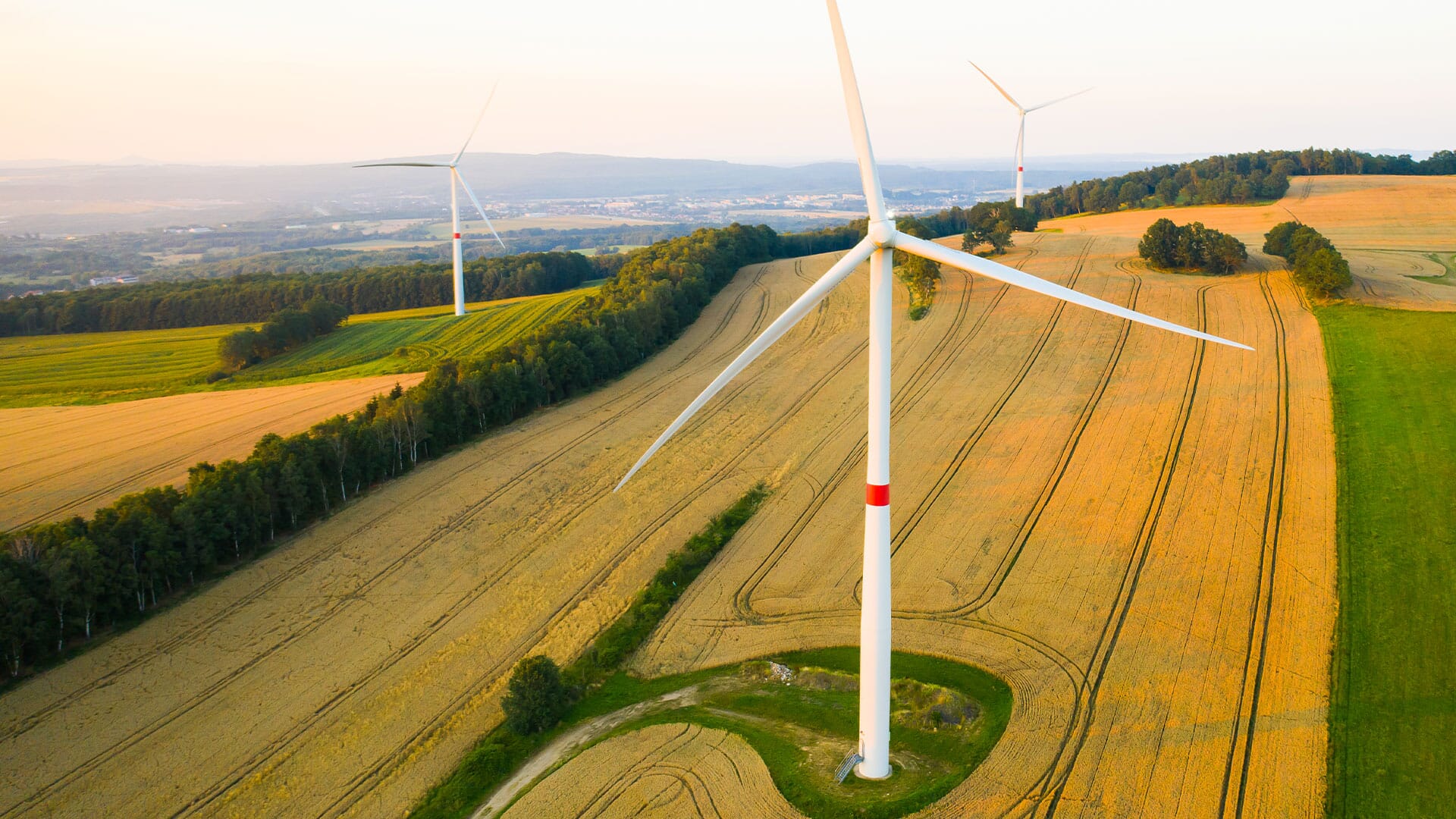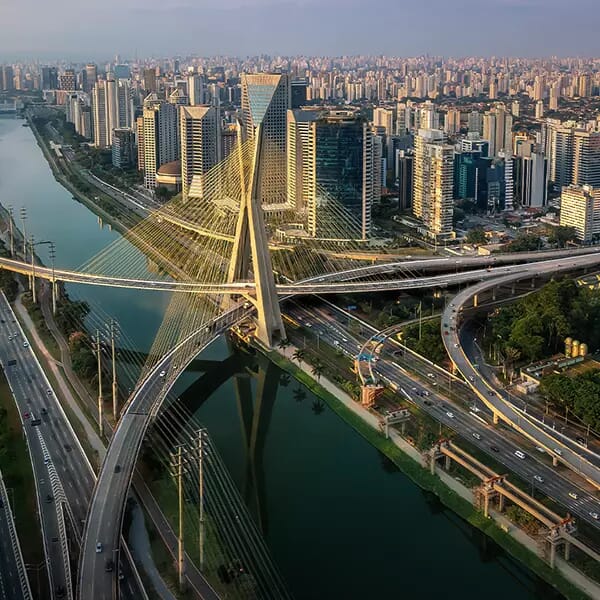 Credit: Rimidolove / Envato Elements
Credit: Rimidolove / Envato ElementsInfrastructure and energy companies lead the way in building a green future
Investments in ESG practices have become a priority for market leaders
April 5, 2022Infrastructure
Many actions focusing on Environmental, Social and Governance (ESG) have been underway in Latin America since last year’s COP26 in Glasgow. Companies, executives and governments are increasingly committing to moving away from non-sustainable activities and projects to build towards a green future. Within the infrastructure and energy industries, this commitment has been on the rise since long before now.
In face of this scenario, The International Financial Reporting Standards Foundation (IFRS) announced the "International Sustainability Standards Board (ISSB)" initiative in 2021, signed by 36 countries originally, 3 of them from Latin America: Brazil, Mexico and Uruguay. According to the Economic Commission for Latin America and the Caribbean (ECLAC), “the objective of this initiative is to develop a global sustainability baseline to meet investors' needs for information on companies' ESG strategies which, incidentally, impact the value of their businesses. Investors demand high quality, transparent and globally comparable sustainability information that is consistent with financial statements”.
The Colombian company, dedicated to “the structuring, promotion, management and development of road and airport infrastructure projects”, will achieve this by reducing 68% of emissions related to fossil fuels and electric power and 15% of emissions related to value chain until 2030. Today, effective measures have been enforced in Odinsa’s projects, such as the 10.369 solar panels installed in the El Dorado airport through a partnership with Celsia: the largest photovoltaic installation in an air terminal in Latin America. This action avoided 1.255 tons of CO2eq being emitted since its implementation, accounting for the same amount of CO2 absorbed by 70.000 trees.
Marhnos, a company with over 67 years of experience in real estate and infrastructure development, takes on a similar approach, having received for 16 consecutive years the Socially Responsible Company (ESR) distinctive from the Mexican Center for Philanthropy, AC (Cemefi), and the Alliance for Corporate Social Responsibility (AliaRSE). In recent years, the company has been following a series of recommendations of the 2030 Agenda for Sustainable Development, which comprises 17 Sustainable Development Goals (SDGs). The implementation of the SDGs in companies’ business models, as Marhnos highlights, offers significant benefits. In their own words, SDGs provide:
Better links: By recognizing the needs and demands of their different stakeholders, they establish more effective relationships with collaborators, partners, clients, and the community in general.
Adaptation to the environment: With actions for the care of the environment, they reduce the impacts of their actions and integrate more effectively into the environment where they are developed.
Competitiveness and performance: A vision of sustainability can increase the competitiveness and performance of companies, through more efficient management of its resources, both human and material.
Atlas Renewable Energy has also been a major player in ESG investments in the energy sector. The company is a worldwide leader and investor in renewable energy sources and has grown into one of the most recognized companies of this segment in Latin America. To encourage more sustainable practices, they shared a sustainability report carried out from 2017 to 2020 and inspired by the SDGs. Atlas selected nine SDGs since 2017, narrowing down their scope to a couple of core SDGs and seven material ones:
Core SDGs: Affordable and clean energy; climate action.
Material SDGs: Quality education; gender equality; decent work and economic growth; industry, innovation and infrastructure; reduced inequalities; sustainable cities and communities; responsible consumption and production.
These guidelines are combined with three sustainability pillars in the communities where the company operates: (1) bolstering quality education; (2) advocating for gender equality; and (3) enhancing sustainable living.
Learn more and join: https://www.griclub.org/event/infrastructure/latam-gri-infra-energy-2022_3589.html
Written by Lucas Badaracco
Latam GRI Infra & Energy 2022 will connect the most influential infrastructure players and government representatives on May 11th and 12th in The Westin New York at Times Square, New York, USA.
[1] You can read GRI Club’s exclusive interview with Mauricio Ossa Echeverri (CEO, Odinsa) in our article available in Spanish: https://www.griclub.org/news/infrastructure/el-rol-de-odinsa-en-los-proyectos-5g-de-colombia_1645.html
In face of this scenario, The International Financial Reporting Standards Foundation (IFRS) announced the "International Sustainability Standards Board (ISSB)" initiative in 2021, signed by 36 countries originally, 3 of them from Latin America: Brazil, Mexico and Uruguay. According to the Economic Commission for Latin America and the Caribbean (ECLAC), “the objective of this initiative is to develop a global sustainability baseline to meet investors' needs for information on companies' ESG strategies which, incidentally, impact the value of their businesses. Investors demand high quality, transparent and globally comparable sustainability information that is consistent with financial statements”.
Front-runners in sustainability and transparency
Some key players in the Latin American infrastructure market have made public their most recent efforts seeking sustainability and transparency. Odinsa, a concessions company of Grupo Argos in Colombia, for instance, has shared with GRI Club details about mid and long-term goals in this regard. CEO Mauricio Ossa Echeverri reveals a solid and well-planned strategy based on the Paris Agreement on climate change, which aims to avoid a global temperature increase above 1.5ºC. According to him, one of Odinsa’s goals is to mitigate greenhouse gas emissions using a Science Based Targets methodology.[1]The Colombian company, dedicated to “the structuring, promotion, management and development of road and airport infrastructure projects”, will achieve this by reducing 68% of emissions related to fossil fuels and electric power and 15% of emissions related to value chain until 2030. Today, effective measures have been enforced in Odinsa’s projects, such as the 10.369 solar panels installed in the El Dorado airport through a partnership with Celsia: the largest photovoltaic installation in an air terminal in Latin America. This action avoided 1.255 tons of CO2eq being emitted since its implementation, accounting for the same amount of CO2 absorbed by 70.000 trees.
Marhnos, a company with over 67 years of experience in real estate and infrastructure development, takes on a similar approach, having received for 16 consecutive years the Socially Responsible Company (ESR) distinctive from the Mexican Center for Philanthropy, AC (Cemefi), and the Alliance for Corporate Social Responsibility (AliaRSE). In recent years, the company has been following a series of recommendations of the 2030 Agenda for Sustainable Development, which comprises 17 Sustainable Development Goals (SDGs). The implementation of the SDGs in companies’ business models, as Marhnos highlights, offers significant benefits. In their own words, SDGs provide:
Better links: By recognizing the needs and demands of their different stakeholders, they establish more effective relationships with collaborators, partners, clients, and the community in general.
Adaptation to the environment: With actions for the care of the environment, they reduce the impacts of their actions and integrate more effectively into the environment where they are developed.
Competitiveness and performance: A vision of sustainability can increase the competitiveness and performance of companies, through more efficient management of its resources, both human and material.
Atlas Renewable Energy has also been a major player in ESG investments in the energy sector. The company is a worldwide leader and investor in renewable energy sources and has grown into one of the most recognized companies of this segment in Latin America. To encourage more sustainable practices, they shared a sustainability report carried out from 2017 to 2020 and inspired by the SDGs. Atlas selected nine SDGs since 2017, narrowing down their scope to a couple of core SDGs and seven material ones:
Core SDGs: Affordable and clean energy; climate action.
Material SDGs: Quality education; gender equality; decent work and economic growth; industry, innovation and infrastructure; reduced inequalities; sustainable cities and communities; responsible consumption and production.
These guidelines are combined with three sustainability pillars in the communities where the company operates: (1) bolstering quality education; (2) advocating for gender equality; and (3) enhancing sustainable living.
Be part of the change
Did you know an exclusive conference to debate all these efforts will be held next month? On May 11th and 12th GRI Club will host the seventh edition of its Latin America conference: Latam GRI Infra & Energy 2022. This is a key annual event for government authorities, investors, concession operators and specialists in the region, and it represents a milestone, gathering over 300 leaders. The topics to be discussed range from project finance, long-term infrastructure planning, energy transition, green recovery and climate change to ESG bonds, concessions, renewables, urban and digital infrastructures, and international supply chains.Learn more and join: https://www.griclub.org/event/infrastructure/latam-gri-infra-energy-2022_3589.html
Written by Lucas Badaracco
Latam GRI Infra & Energy 2022 will connect the most influential infrastructure players and government representatives on May 11th and 12th in The Westin New York at Times Square, New York, USA.
[1] You can read GRI Club’s exclusive interview with Mauricio Ossa Echeverri (CEO, Odinsa) in our article available in Spanish: https://www.griclub.org/news/infrastructure/el-rol-de-odinsa-en-los-proyectos-5g-de-colombia_1645.html



